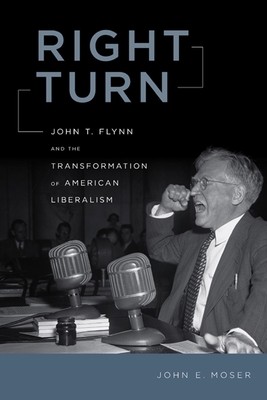
- We will send in 10–14 business days.
- Author: John E Moser
- Publisher: New York University Press
- ISBN-10: 0814757006
- ISBN-13: 9780814757000
- Format: 16.5 x 23.4 x 2.3 cm, hardcover
- Language: English
- SAVE -10% with code: EXTRA
Reviews
Description
John T. Flynn, a prolific writer, columnist for the New Republic, Harper's Magazine, and Collier's Weekly, radio commentator, and political activist, was described by the New York Times in 1964 as "a man of wide-ranging contradictions." In this new biography of Flynn, John E. Moser fleshes out his many contradictions and profound influence on U.S. history and political discourse.
In the 1930s, Flynn advocated extensive regulation of the economy, the breakup of holding companies, and heavy taxes on the wealthy. A mere fifteen years later he was denouncing the New Deal as "creeping socialism," calling for an abolition of the income tax, and hailing Senator Joseph McCarthy and his fellow anticommunists as saviors of the American Republic. Yet throughout his career he insisted that he had remained true to the principles of liberalism as he understood them.
It was America's political culture that changed, he argued, and not his values and views. Drawing on Flynn's life and his prolific writings, Moser illuminates how liberalism in America changed during the mid-twentieth century and considers whether Flynn's ideological odyssey was the product of opportunism, or the result of a set of deep-seated principles that he championed consistently over the years. In addition, Right Turn examines Flynn's role in laying the foundations for the "culture war" that would be played out in American society for the rest of the century, helping to define modern American conservatism.
EXTRA 10 % discount with code: EXTRA
The promotion ends in 10d.10:03:59
The discount code is valid when purchasing from 10 €. Discounts do not stack.
- Author: John E Moser
- Publisher: New York University Press
- ISBN-10: 0814757006
- ISBN-13: 9780814757000
- Format: 16.5 x 23.4 x 2.3 cm, hardcover
- Language: English English
John T. Flynn, a prolific writer, columnist for the New Republic, Harper's Magazine, and Collier's Weekly, radio commentator, and political activist, was described by the New York Times in 1964 as "a man of wide-ranging contradictions." In this new biography of Flynn, John E. Moser fleshes out his many contradictions and profound influence on U.S. history and political discourse.
In the 1930s, Flynn advocated extensive regulation of the economy, the breakup of holding companies, and heavy taxes on the wealthy. A mere fifteen years later he was denouncing the New Deal as "creeping socialism," calling for an abolition of the income tax, and hailing Senator Joseph McCarthy and his fellow anticommunists as saviors of the American Republic. Yet throughout his career he insisted that he had remained true to the principles of liberalism as he understood them.
It was America's political culture that changed, he argued, and not his values and views. Drawing on Flynn's life and his prolific writings, Moser illuminates how liberalism in America changed during the mid-twentieth century and considers whether Flynn's ideological odyssey was the product of opportunism, or the result of a set of deep-seated principles that he championed consistently over the years. In addition, Right Turn examines Flynn's role in laying the foundations for the "culture war" that would be played out in American society for the rest of the century, helping to define modern American conservatism.


Reviews